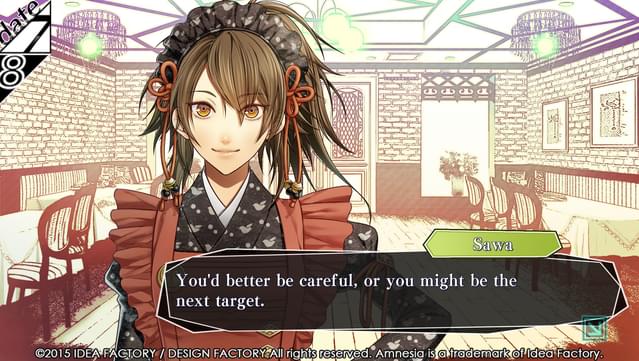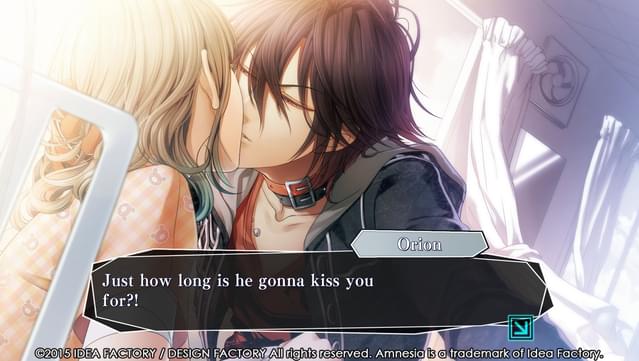Actors are a group of people rife for research opportunities because their profession requires that they remember vast amounts of ever-changing information — and recite that information at a moment’s notice. In a recent study in the journal Cortex, researchers Michael Kopelman (Kings College London) and John Morton (University College London) used the unique experiences of an actor with amnesia to better understand learning in individuals affected by the syndrome.
- Amnesia Memories Characters
- Amnesia Memories Anime
- Amnesia Memories Rating
- Play Amnesia Memories online, free 123
Amnesia Memories Characters
Amnesia: Memories is a full version game only available for Windows, that is part of the category PC games with subcategory Adventure. More about Amnesia: Memories. Since the game has been added to our selection of software and apps in 2016, it has achieved 6.
Amnesia Memories Anime
- When the heroine regains consciousness in an unfamiliar place, she has suddenly lost all memories of everything that happened before August 1. Two-Week Free Trial.
- Bingo Bash is the most popular online Bingo game. Click to play for free in your browser now with no download! Amnesia (6 ) Brain Games (81).
- PlayMemories Home 6.0.00 is available to all software users as a free download for Windows 10 PCs but also without a hitch on Windows 7 and Windows 8. Compatibility with this photo viewer software may vary, but will generally run fine under Microsoft Windows 10, Windows 8, Windows 8.1, Windows 7, Windows Vista and Windows XP on either a 32-bit.
- For small DOS games like Amnesia, you can play online immediately with your browser (Chrome, Firefox, Safari, Internet Explorer.). This feature is still experimental, the game may not work properly. Warning: game save should work, but you should try it early! Also, be careful to select the right game executable in the list below.
In the past 15 years, several studies have examined the impact of hippocampal and medial temporal damage on the learning of semantic information — information relating to general facts and meaning. In these studies, patients, despite their amnesia, were able to learn items such as three-word sentences, word–picture associations, famous names and faces, and household objects. The patients’ success was interpreted as supporting the notion of learning aided by the anterior/inferior/lateral temporal lobe neocortex.
Amnesia Memories Rating

Criticisms of these studies include the fact that they employed very simple tasks and that the learning was demonstrated through forced-choice tasks, cued recall, or familiarity judgments rather than through free recall. The ability to test an amnesiac patient whose real-world profession involved learning and recalling complex material presented an opportunity for the researchers to engage in a more robust test of learning in amnesia.
Patient AB was a professional actor of major prominence who had performed in plays, films, and television programs. During a public meeting in 2005, he suffered a cardiac incident which resulted in hypoxic brain damage to the medial temporal and thalamic structures; at the time of testing in 2006, AB showed severe memory impairment. The researchers used AB’s résumé to pick passages (with an average length of 46.4 words) from 27 stage plays. Thirty-two passages were from plays in which AB had performed and 22 were from plays in which he had not performed.
During the experiment, AB was shown a passage from a play and was asked to read it aloud before trying to recall the name of the play, information about the author and characters, and whether he had previously performed the play. If he reported having played the role, he was asked to recall autobiographical memories and semantic facts relating to the time of the performance. Kyoukai no kanata dvd blu-ray.
Play Amnesia Memories online, free 123
After the first test, AB was asked twice more to read the passage and try to recall it. At the end of the recall task, AB was told the name of the play and again was asked whether he had performed in it. If the answer was now “Yes,” he was asked once again to recall autobiographical memories and semantic facts relating to the time of the performance. One week later, AB was retested on a small subset of the same passages from the previous trials. Five actors of similar eminence and experience also performed the task and served as comparison subjects.
At first, AB incorrectly reported that he had not performed in any of the plays from which the passages were taken (88.6% correct identification for control subjects); however, after being told the names of the plays, he correctly identified his performances 80% of the time (100% for control subjects). AB was able to recall fewer semantic facts and autobiographical memories related to the passages compared with the control subjects, even after being told the names of the passages and after recognizing that he had performed them. Santa sleigh game miniclip.
Even though AB initially did not remember having performed any of the passages, he showed significantly better recall of lines from plays he had been a part of; however, after the first trial, the rate at which he learned (or relearned) the lines was essentially the same for previously performed and nonpreviously performed plays. His retention for lines 1 week later was good: Although AB showed reduced recall of the passages as compared with nonamnesiac peers, the slope of his learning was approximately parallel to theirs, indicating that his rate of learning was unimpaired.

The authors suggest that the rehearsal involved in memorizing the lines of a play is likely to involve both the extraction of meaning (semantic learning) and the anchoring of that meaning in an autobiographical context; therefore, this type of learning requires parallel semantic and episodic components. The semantic and procedural skills that AB used during his time as an actor to parse and extract information from passages may have allowed him to remember more at the time of first testing than he might have done otherwise and also potentially helped him chunk information in a way that aided his retention and recall. This, combined with implicit knowledge surrounding the autobiographical context of passages (even if it was no longer consciously available to him), may have contributed to the rather normative learning curve he demonstrated across test trials.
Reference
Kopelman, M. D., & Morton, J. (2015). Amnesia in an actor: Learning and re-learning of play passages despite severe autobiographical amnesia. Cortex, 67, 1–14. Hack drag racing 4x4.